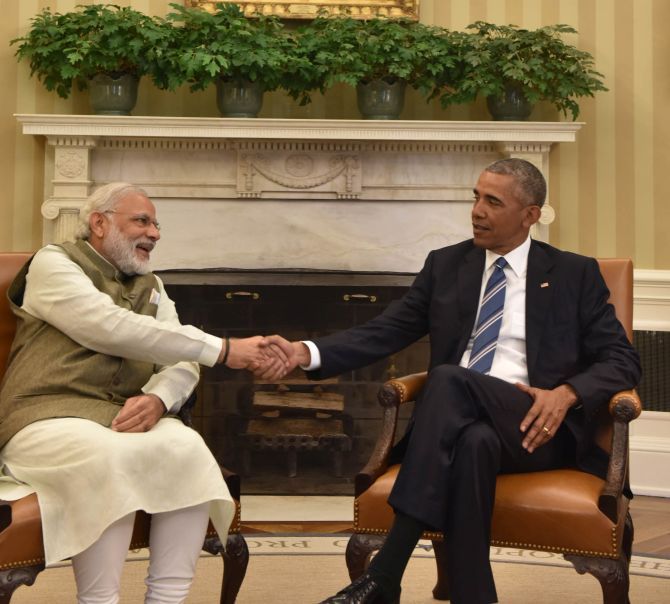'Part of the problem lies in the US failure to stay focused on the goal of convincing Pakistan to crack down on terrorists that attack India.'
'The US should have reacted more strongly to the release from jail of Mumbai attack mastermind Zaki-ur Rehman Lakhvi last year and pressured Pakistan over its failure to prosecute the Mumbai attackers.'

A former diplomat in the US embassies in India and Pakistan, Lisa Curtis has been an analyst for the Central Intelligence Agency, senior adviser to the assistant secretary of state for South Asian affairs in the George W Bush administration and has testified before the US Congress on about 20 occasions on topics related to India, Pakistan, Afghanistan, Bangladesh, Islamist extremism and America's image abroad.
Currently a senior research fellow on South Asia at The Heritage Foundation's Asian Studies Centre in Washington, she has worked for the US government on South Asian issues for 16 years.
In an e-mail interview with Rediff.com's Archana Masih, Curtis says Washington should condition its military aid to Pakistan on its efforts to crack down on groups that attack India, and warns that India should be careful not to play into Pakistan's trap of trying to escalate military tensions in order to bring international attention to Kashmir.
Pakistan has once again said it is India's tradition to blame Pakistan -- why hasn't world opinion prevailed upon Islamabad to shut down the terror camps or arrest terror masterminds all these years?
Part of the problem lies in the US failure to stay focused on the goal of convincing Pakistan to crack down on terrorists that attack India.
While the US gets on the ball whenever a crisis breaks out (like now), Washington has repeatedly failed to hold Pakistan's feet to the fire on cracking down on anti-India terrorist groups.
The US should have reacted more strongly to the release from jail of Mumbai attack mastermind Zaki-ur Rehman Lakhvi last year and pressured Pakistan to a greater extent over its failure to prosecute the Mumbai attackers.
The US should place as much priority on Pakistan cracking down on LeT and JeM (Lashkar-e-Tayiba and Jaish-e-Mohamed) as it does on groups like Al Qaeda and the Haqqani Network.
What should the US role be, especially since Pakistan Prime Minister Nawaz Sharif is in New York to address the UN General Assembly?
US officials must prevail on both Pakistani and Indian leaders to lower their rhetoric at the UN General Assembly and to stop referencing developments on the other's territory.
The US should convince both sides to agree to scrap any mention of either Kashmir or Balochistan during their formal UN statements.
India perhaps has never been under such pressure to take action against Pakistan. What should be the right reply to the Uri attack?
Indian leaders should make a careful evaluation of the costs and benefits of each potential response to the Uri attack, keeping their long term goals vis a vis Pakistan in mind.
They should be careful not to play into Pakistan's trap of trying to escalate military tensions on the subcontinent in order to bring international attention to Kashmir.
India should seek to build on the frustration within the US Congress regarding Pakistan's failure to crack down on terrorists that attack in Afghanistan, making common cause with US officials to develop a joint diplomatic strategy to pressure Pakistan on its continued support for terrorism.
During the Kargil War, the Parliament attack and the Mumbai attacks, India did not cross the LoC -- what are India's diplomatic and military options?
Any military response to the Uri attack will likely invite a Pakistani counterstrike, sending the two countries up the escalation ladder.
Military escalation between two nuclear powers would likely spook foreign investors, similar to how it did during the 2001-2002 Indo-Pakistani military mobilisation.
 What does America need to do more and further from condemning the attack that can result in something concrete for India this time?
What does America need to do more and further from condemning the attack that can result in something concrete for India this time?
Washington should condition its military aid to Pakistan on its successful efforts to crack down on groups that attack India, like the LeT and JeM. Such conditions were part of the Kerry-Lugar-Berman bill several years ago, and should be revived.
How has the unrest in Kashmir been a factor in this attack?
It appears Pakistan is seeking to take advantage of the current civil unrest in Kashmir.
Pakistani leaders may have calculated that a major militant attack in the midst of the civil unrest in Kashmir and the convening of the UN General Assembly in New York would redound in their favor by spotlighting the high stakes involved in the conflict.
It is a risky gambit for Pakistan, however, because such a high profile attack also spotlights Pakistan's continued support for terrorism.
Despite its efforts to portray itself as the protector of Kashmiri human rights, Pakistan has been more intent on stoking violence in the region to bleed India and embarrass it on the international stage.
The reality is Islamabad has disrupted several attempts by Kashmiri separatists to forge peace with New Delhi.
It is widely believed, for instance, that Pakistani intelligence murdered separatist leader Abdul Ghani Lone in 2002 for his attempts to reach an understanding with New Delhi.
It is remarkable that Pakistan issued a statement today referring to US President Clinton's promise to stay engaged on Kashmir from 1999.
Putting the statement into context, Clinton made it following a meeting in which he forced Nawaz Sharif to agree to pull back Pakistani troops to end the Kargil conflict.
The decision to occupy the heights at Kargil in May 1999 may have been the single biggest mistake of the Pakistan military since its launch of Operation Gibraltar in 1965.
Pakistan's continued attempts to disrupt the status quo in Kashmir will come with increasing diplomatic costs in a post-9/11 world.
- How India can execute a military strike in Pakistan
- Time to hit and hurt the Pakistan army!
- Are the Days of Strategic Restraint Over for India?
- 'Proxy war has to be fought by proxy terrorism'
- The implications of the Uri attack
- 'India has no good military options'
- Pakistan will force India to the negotiating table
- Pakistan tends to resemble a suicide bomber











 © 2025
© 2025